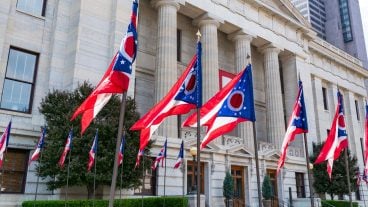Farmer’s Guide to Trucking Regulations available to Ohio Farm Bureau members
The guide includes a farm driver checklist, overview of state and federal regulations and exemptions, CDL qualifications and more.
Read More
Asserting that “Business is Everybody’s Business,” six major Ohio business associations today released legislative priorities aimed at improving and enhancing Ohio’s business and job climate and increasing opportunities for Ohio families.
Ohio Farm Bureau is among the six associations, including the Ohio Business Roundtable, the Ohio Chamber of Commerce, National Federation of Independent Business Ohio and the Ohio Council of Retail Merchants, that put forth objectives in areas such as taxation, regulation, education and energy among others.
“Ohio’s economy is the engine that provides incomes to our families, whether breadwinners work in the public or private sector,” said Pat Tiberi, president and CEO of the Roundtable. “Every Ohioan has an interest in seeing to it that Ohio has a strong economic climate because that’s what produces the income for everything we hold dear, whether it’s good jobs, great education, opportunities for our children, leisure activities, the arts or any other phase of our Ohio quality of life. No matter what each person’s interest, we all have a stake in a strong Ohio. Business is truly everybody’s business.”
State Sen. George Lang, R-West Chester, chair of the Ohio House and Senate Business First Caucus, responded, “As a small business owner and chair of the Business First Caucus, I appreciate the six groups that represent most businesses in the state coming together and sharing recommendations on those issues most important to them with the Ohio Legislature. They are right; business is everybody’s business. I look forward to continuing to work toward making Ohio the most business-friendly state in the nation.”
The guidelines for legislators and policymakers are included in a brochure forwarded today to members of the Ohio General Assembly and state executive branch leaders. The brochure makes the observation that like any machine, Ohio’s economic engine requires periodic maintenance, repair or updating. A number of recommendations tie directly to the coming aftermath of the COVID-19 pandemic, and others are recommendations that have appeared on such lists before, and remain important to Ohio.
“We are mutually committed to cooperating on advocacy for these important business goals,” said Roger Geiger, executive director of NFIB-Ohio. “Working together, we send an unambiguous message about what is important to our state from a business standpoint.”


The guide includes a farm driver checklist, overview of state and federal regulations and exemptions, CDL qualifications and more.
Read More


Ohio Farm Bureau provides opportunities, platforms and resources to help you develop your voice in the industry and give farmers a seat at the table with leaders and legislators.
Read More

The emergency fuel waiver to allow the sale of summer gasoline blends containing 15% ethanol will lengthen the period during which Americans can continue buying E15 from June 1 to Sept. 15.
Read More

The Small-Scale Food Business Guide covers federal and state regulations for selling food products such as raw meat, dairy, eggs, baked goods, cottage foods, fruits and vegetables, honey and more.
Read More

New resources and technology are broadening the different types of sales tools and strategies available to farmers.
Read More

ODA will enroll 500,000 acres into the program for a two-week sign-up period, beginning April 22, 2024, through May 6, 2024. Contact local SWCD offices to apply.
Read More

Katie Share of Columbus has been named ExploreAg and Youth Development Specialist for Ohio Farm Bureau.
Read More

Mary Klopfenstein of Delphos has been named Young Ag Professional and Ag Literacy Program Specialist for Ohio Farm Bureau.
Read More

The plan has been updated to give sole proprietors access to more rate stability and a smart solution that offers potential savings on health care.
Read More

The American Farm Bureau Federation, in partnership with Farm Credit, is seeking entrepreneurs to apply online by June 15 for the 2025 Farm Bureau Ag Innovation Challenge.
Read More